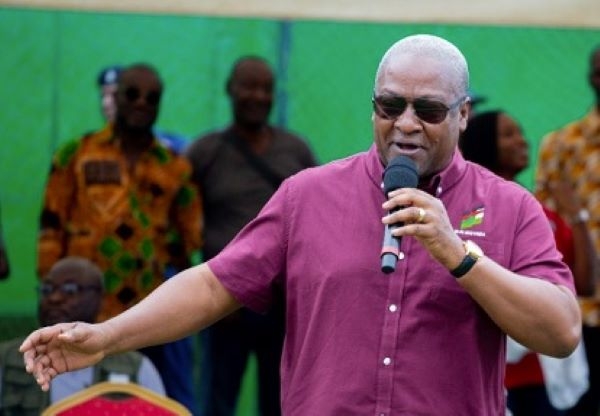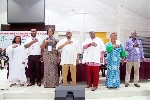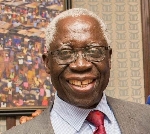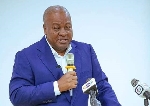Push NDC’s electoral reforms proposal – Mahama to chiefs
 Former President John Mahama
Former President John Mahama
Former President John Mahama has appealed to chiefs in the country to help push the main opposition National Democratic Congress’ proposed electoral reforms through.
Addressing chiefs in the Eastern Region, as part of his Thank You tour, the 2020 flag bearer of the NDC said: “It is our hope that the National House of Chiefs and the Regional House of Chiefs will join voices with us so that we have an independent view of the proposals that have been brought because, in most cases, after an election, the Electoral Commission takes steps to set up a panel to look at some of the issues that went wrong and come up with proposals for making sure we correct them. We expect that this Electoral Commission will do same”.
Among other things, the party is proposing that there must be prior parliamentary approval for the appointment of the Chairperson of the Electoral Commission and its commissioners.
The proposals were compiled by a team of experts in the NDC led by former Chief of Staff Nana Ato Dadzie and Local Government expert Professor Kwamena Ahwoi.
The recommendations were presented at a stakeholder forum held by the party.
The proposed electoral reforms, according to the party, require action by the executive, legislature and bodies other than the EC.
Arguing for the recommendation to have prior parliamentary approval for the appointment of EC members, the NDC said the EC’s critical requirements include independence, neutrality, credibility, transparency and competence and the perception of these requirements.
The party noted that the current mode of appointment “makes the EC appear partisan”, adding: “Representatives of the people must have a hand in their appointment”.
Justifying the proposal, the NDC argued that if the appointment of Supreme Court Justices with similar critical requirements involve prior parliamentary approval, then the appointment of EC Commissioners must not be any different.
The NDC said the Constitution Review Commission (CRC), of which the current EC Chairperson was a member, recommended prior parliamentary approval for the appointment of EC commissioners.
The government White Paper on the CRC Report, the NDC recalled, accepted the recommendation of prior parliamentary approval.
Also, the NDC proposed a repeal of the requirement of the consent of the Attorney General before the prosecution of electoral offences.
It said Section 42 of the Representation of the People Act, 1992, PNDCL 284, requires this consent.
According to the party, the police use the provision “as an excuse for the non-prosecution of high-profile electoral offences”.
“This creates a culture of impunity and undermines fairness and credibility of Ghanaian elections”, the NDC posited.
Justifying the proposal, the NDC said the Attorney General is a “partisan political appointee and a member of an incumbent government” and, so, “faces the difficulty of consenting to the prosecution of such offenders who are, very often, his/her ministerial colleagues or his/her party supporters and activists”.
“The non-prosecution leading to impunity is detrimental to Ghana’s democracy and encourages others to repeat the offences”, the NDC said.
“This proposal was first made by the EC’s own Electoral Reforms Committee in 2015”, the NDC recalled.
The party also suggested that “specially-designated courts should be appointed exclusively for electoral disputes and offences before, during and after registration of voters and elections”.
According to the party, “there is undue delay in the adjudication of electoral disputes and offences in Ghana”, noting: “There are no courts with specialisation in election matters in the country”.
The justification for this proposal was that it will “ensure a balance between the need for justice and the need for the expedition of judicial proceedings, avoid an illegitimate President being in office for too long, and avoid an illegitimate MP representing the electorate”.
“The proposal takes into account the period required for reviews (Supreme Court) and appeals (Court of Appeal). It will help develop courts with specialisation in election dispute matters”, the NDC said.
It noted that the proposal was first made by the EC’s own Electoral Reforms Committee in 2015.
Source: classfmonline.com
Trending News

Free SHS: Market women laud policy for bridging inequality in education
09:47
NDC to officially introduce Prof Naana Opoku-Agyemang as running mate tomorrow
10:15
TEWU elects 1st female national chairperson
10:32
Public schools rebranding: Adutwum introduces new uniforms for basic school students
06:52
Lift veil on assets declared by public officials – Osafo-Maafo
14:33
I'll address challenges with Free SHS in 100 days as president - Mahama
10:31
Osafo-Maafo’s dumsor timetable comment attempt to scuttle Napo's running mate bid - Mornah
09:11
GRASAG optimistic about Mahama's 24-Hour economy
10:16
Murder of US national: Police arrest 2 at Assin Prasso
10:31
Tema West: Akufo-Addo nominates Felicia Attipoe as MCE
08:55



